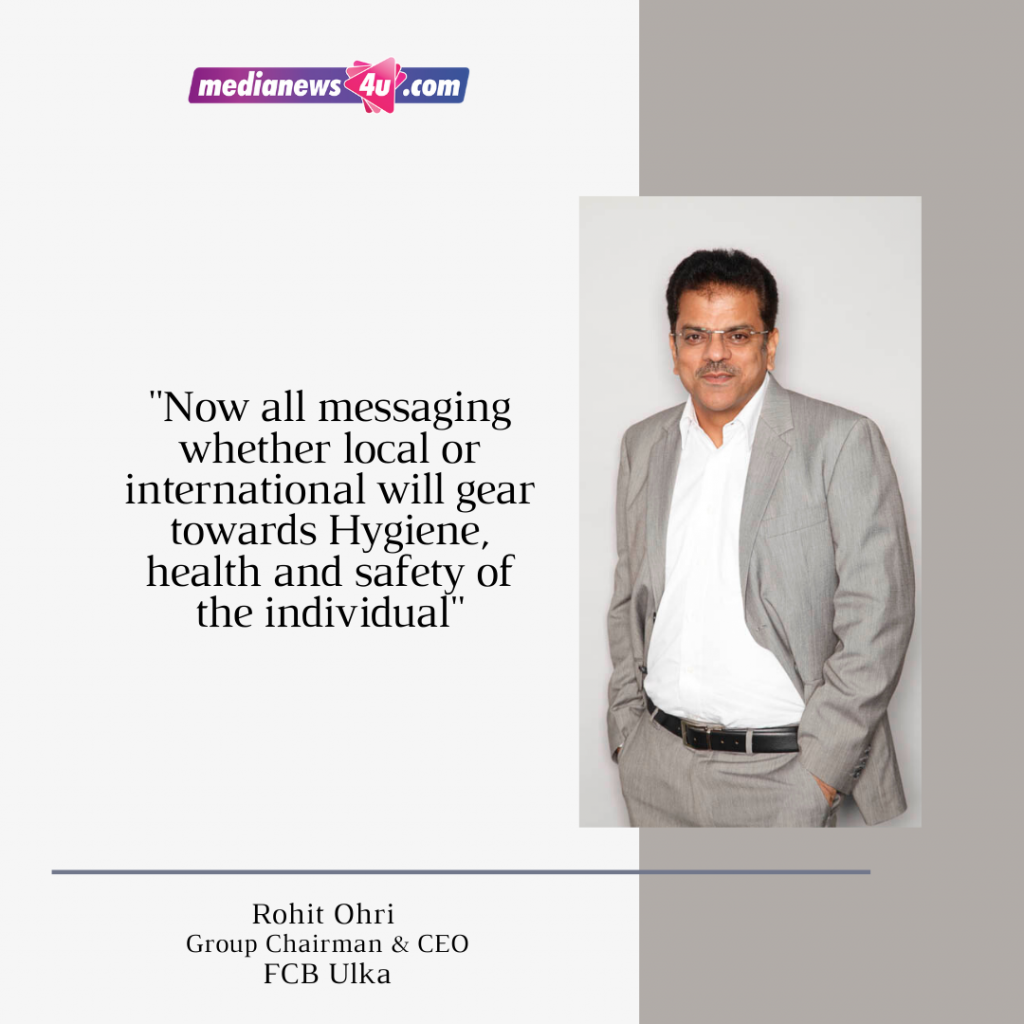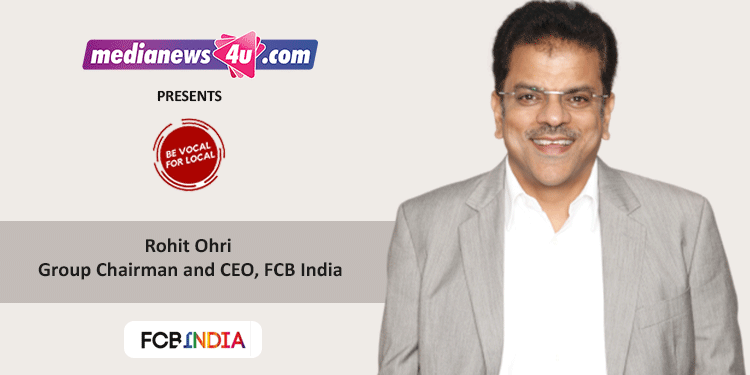In his last address to the nation, and during his ‘Man Ki Baat’ address on Sunday he again stressed on this point.PM Narendra Modi had made a clarion call to support local brands. During this time of crisis it has made us realize the importance of local traders who have helped the country sustain during this long period of Lockdown due to the Coronavirus, he said.
As per many Experts despite the PM’s call, India will remain an open market and home-grown brands are not going to get any preferential treatment from the government. They have to win the consumer on the back of quality, innovation, pricing, and the right marketing mix.
We at MediaNews4u have spoken to people from various sectors, start-ups, and brand consultants to understand as to what how they have interpreted the term ‘Be Vocal for Local’.
Today, continuing with our series on ‘Be Vocal for Local’ we speak to a Brand Custodian Rohit Ohri – Group Chairman and CEO, FCB India
How do you interpret this term Go Vocal for Local?
Be vocal for local is the Prime Minister’s way of looking and supporting Indian businesses and the government for tenders below a certain level that they are making and it has to be an Indian company, so taking away that global competition from there. Now, the thing is that it is a good, maybe short term measure, but in the long term, we are looking at the ease of doing business, we want India to be an alternative to China and manufacturing, we want to invite global brands, the PM has gone all over the world to talk about Indian global brands.
The whole thing is that it is a bit of a contradiction where on the one hand we want to be a globally competitive economy, on the other hand, we want to also be vocal about local. The way I see it is good, short term measure and looking to get back on their feet and once we do that, I think the reality of it will be that we need to compete globally because I think the next five years will define the future of India, it can become the superpower that everyone talks about, it is because we have a huge opportunity, as every country in the world is looking at an alternative to China for many reasons, I think this is really a fantastic time for us to actually invest behind infrastructure and ease of doing business so that we can attract more people to set up shop in India.
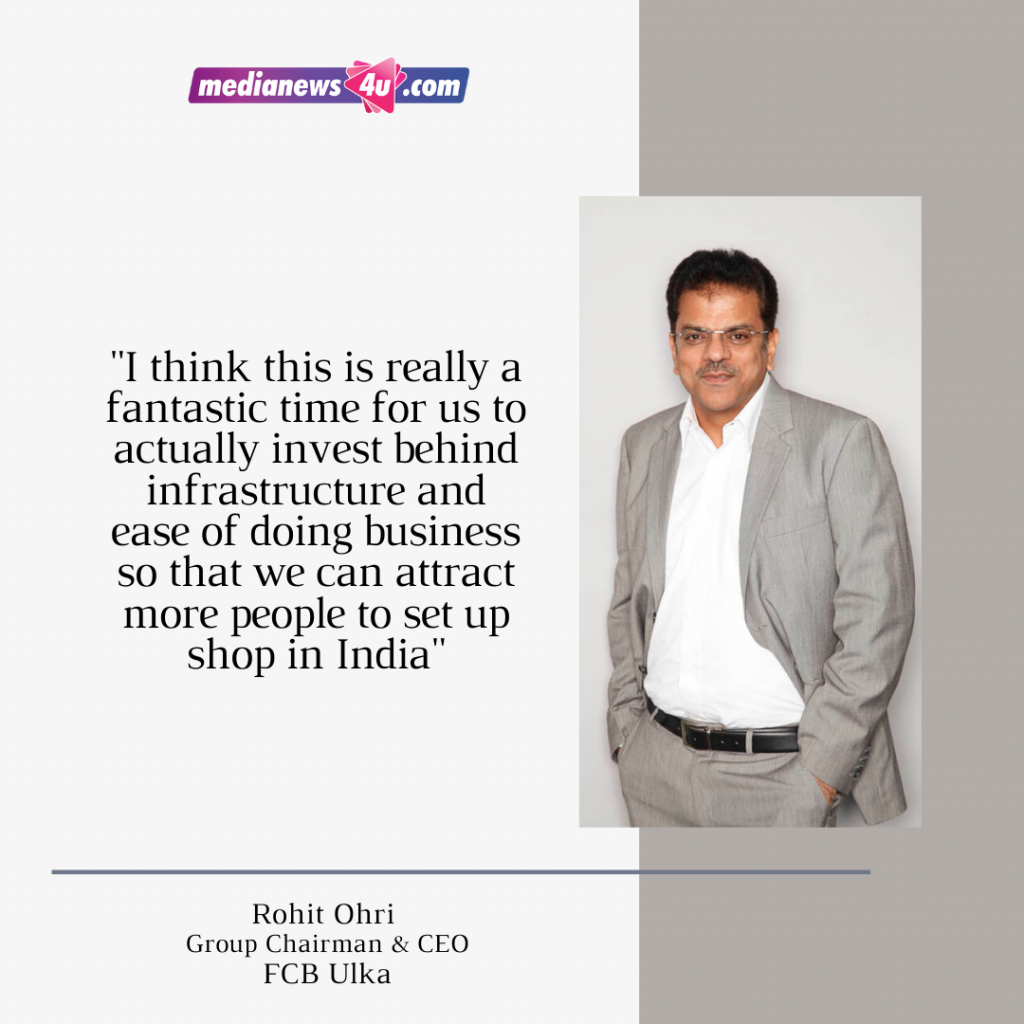
Is there a difference between local and Swadeshi, how would you differentiate it?
I would not actually differentiate, quite honestly because I think local is really about many forms actually, Swadeshi is a subset of local and local is a bigger space where you can even look at your local mom and pop stores. One of the big things that happened and we are seeing this whole trend now, thanks to the virus, people have actually reverted back to their local Kirana stores because they were the guys who actually came through in this time of crisis. A lot of the big brands actually shut down deliveries and people like these came in as frontline warriors and so many stories of people who actually took their own cars out went out got provisions, restocked their own shops with the necessary essentials. The thing there is a sense of safety also now you would not want to travel in public transport, but rather walk to a neighborhood restaurant, coffee shop, store and that whole thing of in your locality, is something that you do actually look at and build, that is one aspect of local. The local is also about what is being produced locally in India, whether it is in the rural areas or urban areas it is the produce of India we are looking at.
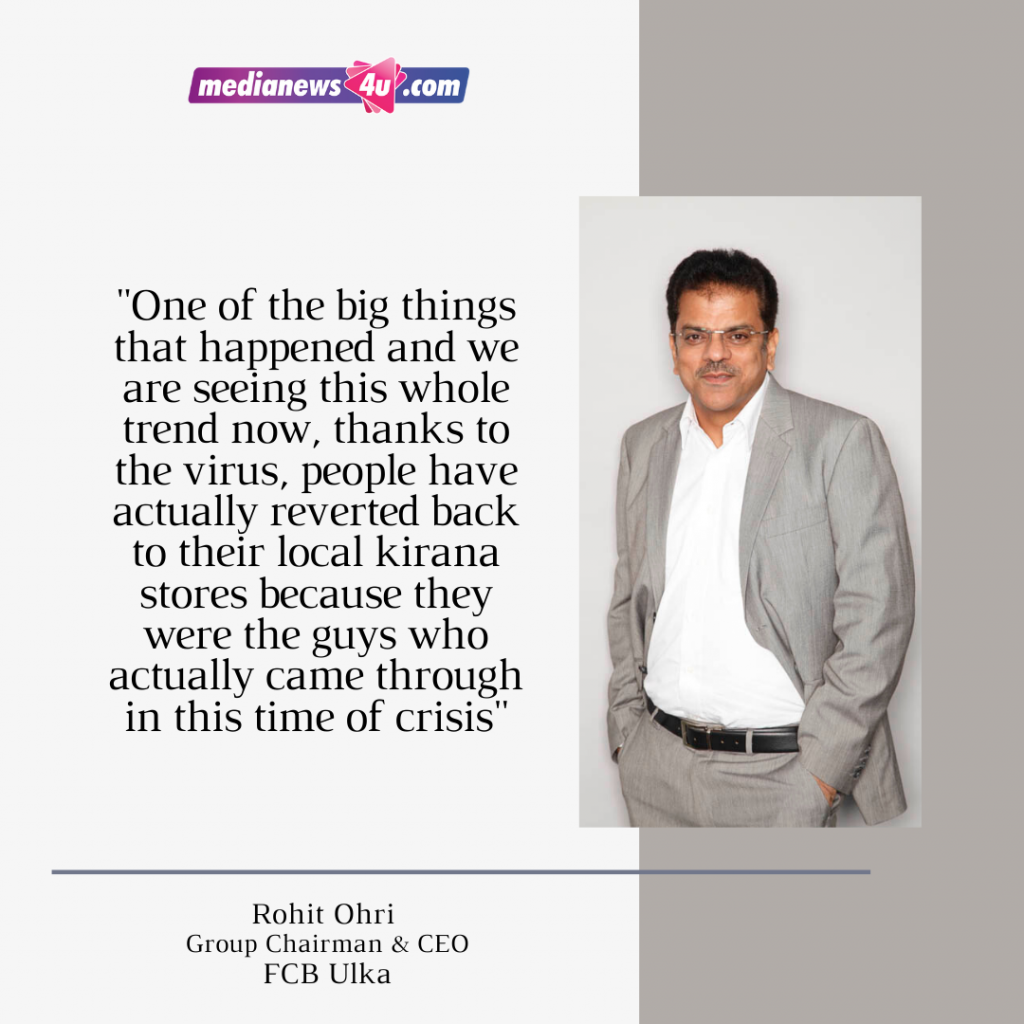
The other thing I think, what I feel actually, that there is a big shift that is going over the ambit of what the Prime Minister may have actually said, I am looking at it are there are many elements to local; it is about where you live and the locality that is more important than the larger city that you want to explore and that your own network is where you feel safe. I am remembering the lines at this present moment, ‘Honey I have shrunk the world’
On one hand, we talk about the world is a global village and now in a completely different way we are saying that I want to stay in my locality and I do not want to go anywhere for now. That whole thing is also about the local and produces various things and this toothpaste is out of the tube and it cannot be put back. I mean there are so many multinational companies who have been in India for such a long period of time which people think is Indian but is actually global when I mean that we will not buy from there and buy from the local Mochi is something which is not going to happen.
But you know where all things equal you may want to say that okay we will support for instance, some handicrafts that people actually reach out to, buy a saree from a local weaver or you want to support a local designer, we are doing that. It is more of an awareness about the fact that without these people, our economy will not be able to recover, so if we have to help our economy recover, then you have to support them in the short term. I think that is an important initiative, is to consciously support, one of the things that I feel will be a big difference that we will see is in consumption, from quick consumption to conscious consumption, where we are going to be more aware and mindful of what we consume, and what is the impact of that on our own health, on the health and wellness of our family, and to a great extent also of the health and wellness of the country and the planet Earth. I think everybody has seen that it is possible to do, we can improve the pollution levels, and our own health and the environment. This is what nature wanted to teach humanity. If you give nature a chance she can really make your life better and everybody’s life better.
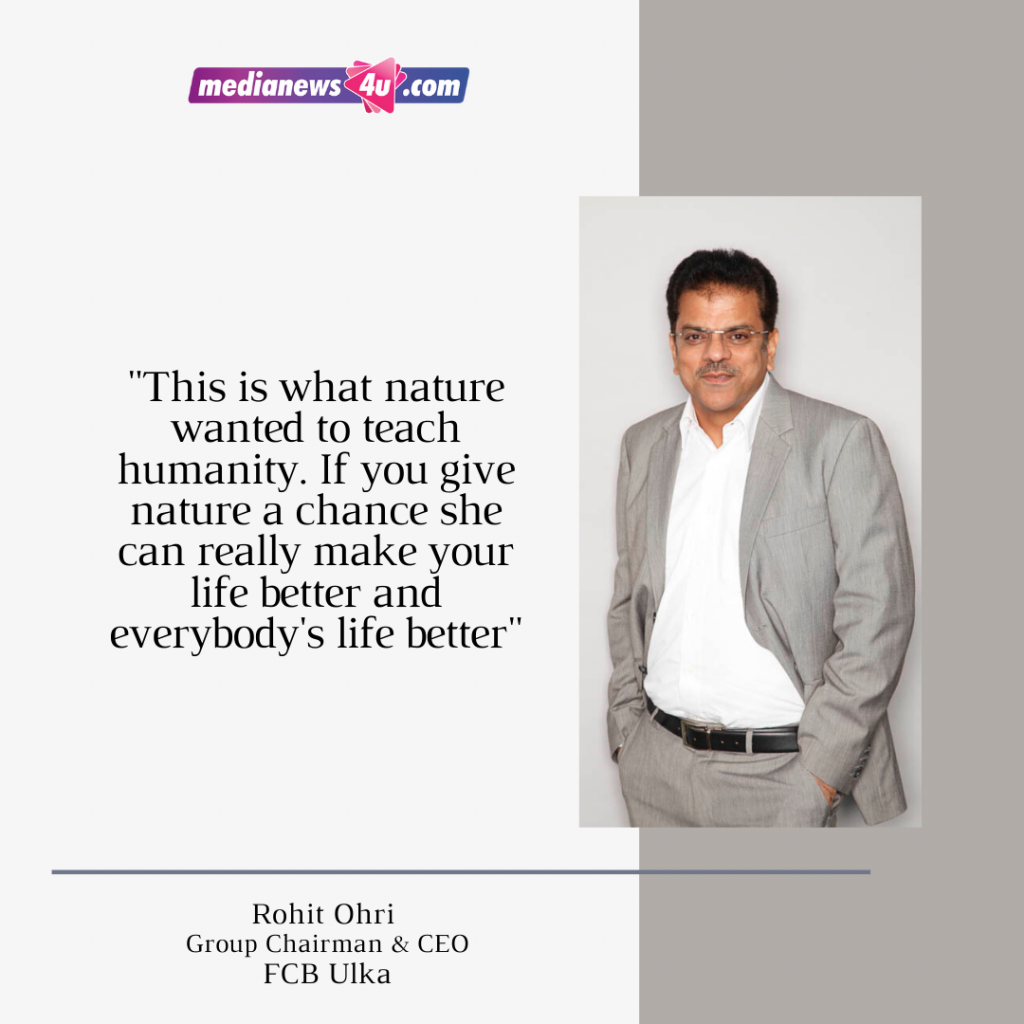
I think that realization has come and I am just hoping that people remember this, but unfortunately, people forget after two years that what had happened and it is a lesson learned and we need to keep reminding ourselves about this thing and we will not be able to survive another, pandemic like this again, the economy has got a jolt out of the blue.
How will companies which may be global but have been in India like HUL, Bata, and other companies who produced here and employ locals, this is a dichotomy?
I do not think that will be an important pivot at this point in time, it will be great for small brands really talk about and remind people that their local brands and we should support them. It is a reminder, the number one thing at this point in everybody’s mind is health and safety, brand narrative is going to be about health and safety and people want a trusted brand, whether they are Indian or international is not of anyone’s concern.
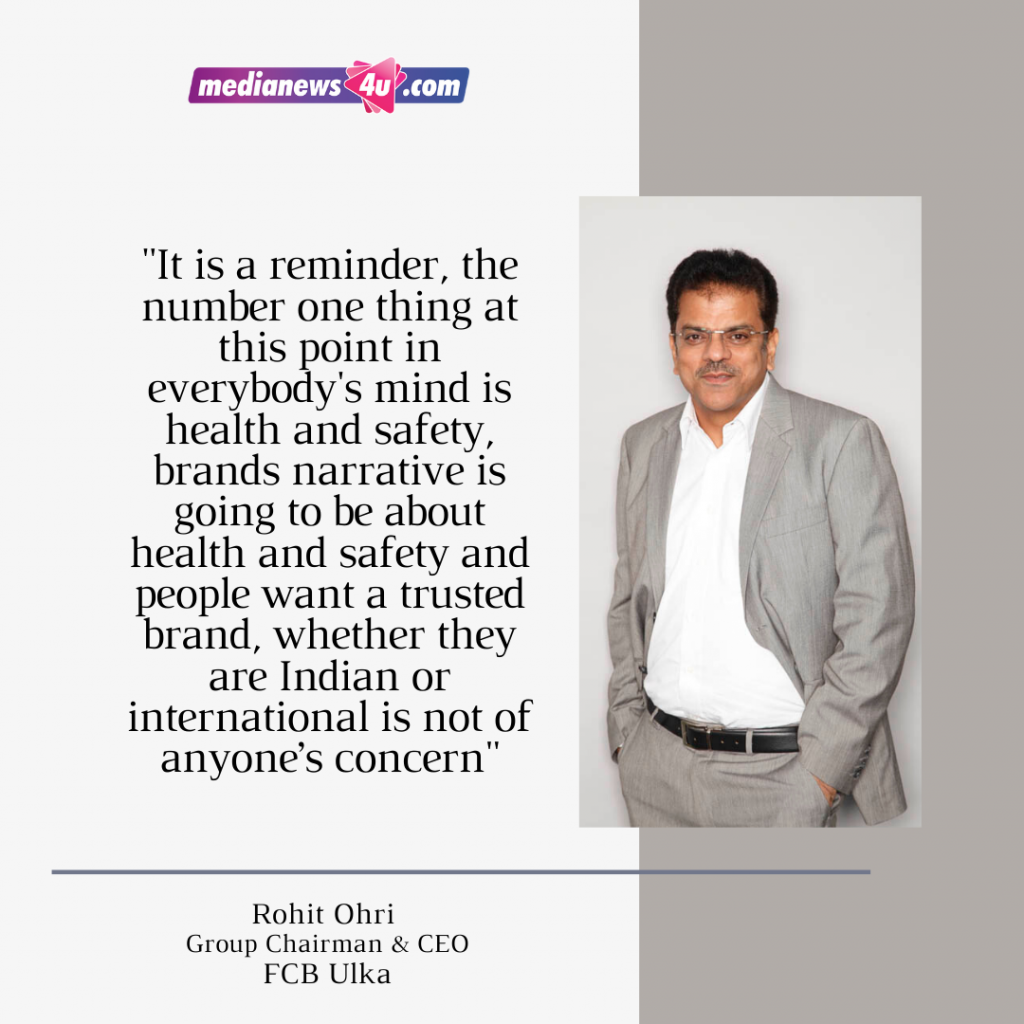
We did big research where we were looking at what would happen if will people go back to restaurants and everybody, all the women and this middle class, not the la di la crowd, they said that they would prefer to go to a Dominos or McDonalds and Pizza hut and not to the local dabbas now, but on the other hand there is a sense of trust that they have in these brands, the hygiene that they maintain and that is the moot point now and the choice now would be health and safety, it is not going to be just because it is local we are going to go. For instance that that local food vendor will get wiped out, but local industry or local handicrafts can actually talk about it and remind people that we need your support. I do think it is going to become a defining thing going forward.
Do you think after this call, a lot of people will now start thinking and wanting to buy Swadeshi goods?
Not exactly, people will still buy what they have been buying and the thing is that people are retracting into and that is the biggest thing that we have seen across many crises and depression that people retract to the trusted brand for comfort. People are not going to say okay let us go local now, it is a new thing and I think that the axis of choice is 100% towards Brands whose messaging will be on health and safety. Brands will talk about health and safety and certain brands talking about how good sleep is important for good immunity. We will find that transition comes in, like for instance, for an automobile brand it is an opportunity for them to talk about safe travel, a lot of companies are coming up with this whole scheme, saying that takes 10% and start paying the balance in 2021. Now all messaging whether local or international will gear towards Hygiene, health, and safety of the individual.
